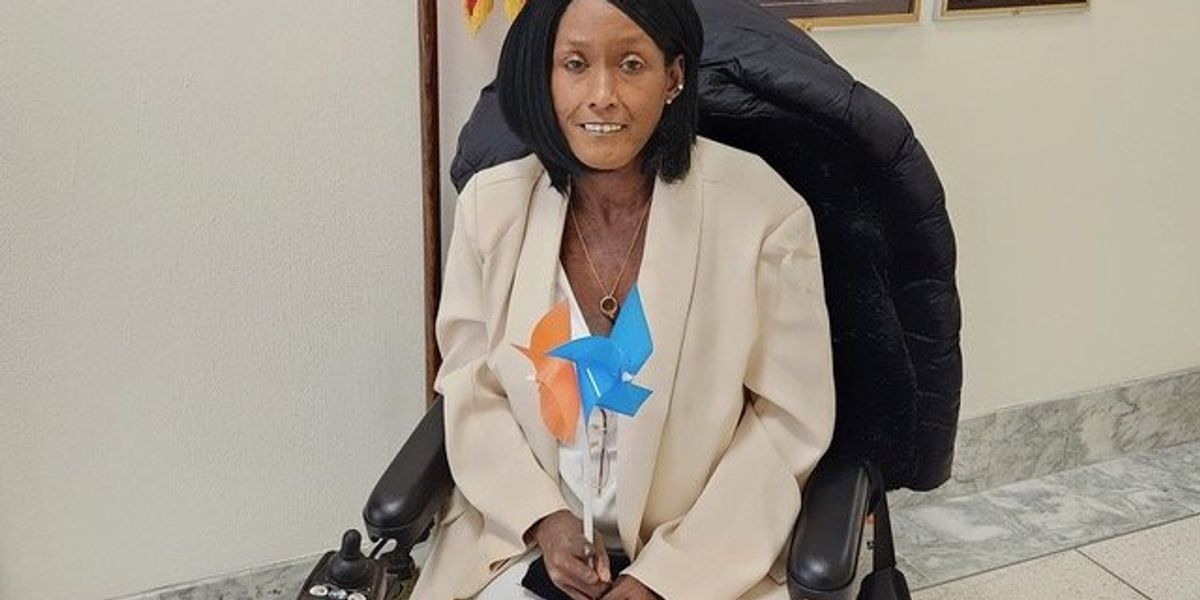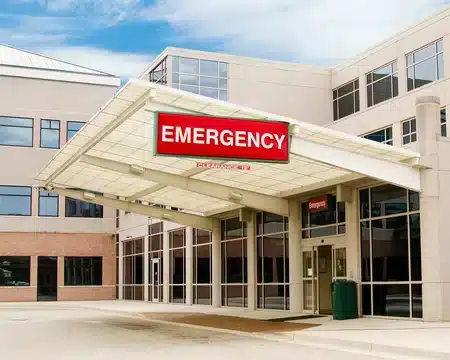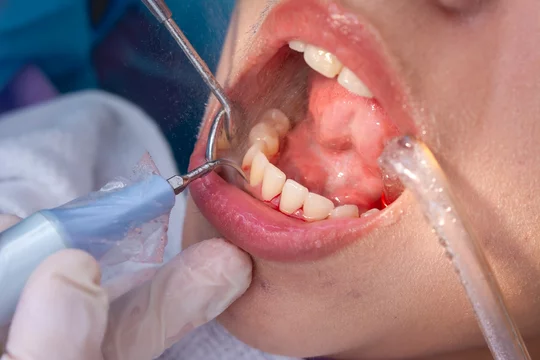He’s 17 and lives in the Chicago suburbs. He loves theater and recently helped direct a play at his high school. He takes competitive AP courses and is working on his Eagle Scout project.
And he’s been on a journey for four years.
Once a week, the transgender teen injects testosterone into his body. He’s had his eggs frozen in case he wants to have his own biological children one day. He talked with his parents and his psychologist and decided he was ready for the next step of treatment: top surgery to remove breast tissue.
“Getting this treatment isn’t fixing something that’s wrong with me,” the teen said. “It’s just helping me grow more into who I want to be and who I can feel most comfortable existing as.”
KFF Health News and NPR are not identifying the teen by name or using his mother’s last name because both are concerned he could be targeted for being transgender.
The teen’s mom, Jane, waited for a call to schedule the surgery at Ann & Robert H. Lurie Children’s Hospital of Chicago. Then, she received a voicemail from the hospital. She said she knew what the message would be even before she listened to it: The surgery wouldn’t happen.
She had already read on social media that Lurie Children’s, located near downtown Chicago, would pause gender-affirming surgeries for people younger than 19 in the wake of an executive order from President Donald Trump.
Jane called Lurie back to confirm that surgeries were on hold, then told her son when he got home from school that day.
“I said, ‘Hey, we are going to take care of you,'” she recalled. “‘We will make it through this.'”
It was devastating, Jane said.
“We are being threatened,” she said. “The trans community is being threatened, and parents are being threatened.”
Email Sign-Up
Subscribe to KFF Health News' free Morning Briefing.
Her son said he feels hurt and confused. His doctors told him after Trump was elected in November that they would fight as hard as they legally could to support him, he recalled. But then Lurie’s leaders decided to cancel pending surgeries and stop scheduling new ones.
“I know that it’s not like a personal thing, like they didn’t look at me directly and go, ‘Yeah, you don’t deserve that,'” the teen said. “But it kind of feels like it sometimes, especially when a lot of what the sentiment has been, in general, towards trans people in society.”
On Feb. 7, a Lurie Children’s spokesperson confirmed the hospital would pause gender-affirming surgeries.
KFF Health News and NPR spoke with 10 patients or their parents in the Chicago area about how this affects their lives. They described their disappointment, their loss of hope for one day having a procedure, and their anger at the timing, when they already feel threatened and marginalized by hateful rhetoric around the country.
These families fear that they eventually could lose access to all gender-affirming care, such as therapy, puberty blockers, and hormones. They’ve also questioned why Illinois officials who have vowed to protect transgender rights have been quiet on what’s happening at Lurie Children’s and elsewhere. Northwestern Memorial Hospital in Chicago has also stopped such surgeries for minors, families told KFF Health News and NPR.
Lurie Children’s decision came after Trump’s executive order on Jan. 28 threatened to cut federal funding to health care providers offering gender-affirming medical care.
“Across the country today, medical professionals are maiming and sterilizing a growing number of impressionable children under the radical and false claim that adults can change a child’s sex through a series of irreversible medical interventions,” according to Trump’s order. “This dangerous trend will be a stain on our Nation’s history, and it must end.”
Another patient, a 16-year-old boy from Chicago, had a surgery date for a double mastectomy procedure — until Lurie Children’s canceled it. KFF Health News and NPR are not identifying him because he fears for his personal safety.
The teen felt betrayed by the cancellation, he said. He has been binding his chest for more than five years, but doing so causes rib and back pain.
Every morning, he faces a choice: bind his chest to fully “pass” as male, or skip that and experience a day without pain. He avoids sports because he can’t breathe as well when his chest is bound. A large part of his gender dysphoria is centered on having breasts, he said.
Lurie Children’s deemed the teen’s surgery “medically necessary,” according to medical documents his family shared with KFF Health News and NPR.
“Lurie’s decision set a precedent not only for other care providers but also for their patients,” said the teen. “They have established that they are no longer the safe haven they have claimed to be for so many years.”
Many of Lurie Children’s patients were referred for surgery to Northwestern Memorial Hospital, a prominent research hospital nearby. Their initial Northwestern appointments were later canceled. A Northwestern spokesperson declined repeated requests to comment.
Parents whose transgender children are receiving other types of medical care at Lurie Children’s, such as hormone therapy, worry about what the hospital might stop providing next.
“If we can’t get estrogen in a year, what do we do?” says the mother of a 15-year-old transgender girl. KFF Health News and NPR are not naming her because she fears retaliation against her daughter if she is identified. “Parents with means are talking about leaving the country.”
The Politics of Pausing Surgeries
In a statement, physician Robert Garofalo said he hears and understands the frustration. He is the founding director of the Gender Development Program at Lurie Children’s.
“My life’s work has been devoted to these children, adolescents, and their families,” Garofalo wrote. “As someone who has spent his entire career at Lurie Children’s, I can assure you these kids and these families matter to this institution. It’s important to know that this decision was painstakingly difficult, and it was made amid unprecedented circumstances and external pressures.”
The hospital’s decision, Garofalo wrote, was based on the belief it could help safeguard most of the clinical services offered by his program.
Surgery among trans youth is rare, researchers have found.
After Trump’s executive order, Illinois Attorney General Kwame Raoul and 14 of his peers in other states vowed to protect access to treatment. In a statement, Raoul said the Illinois Human Rights Act prohibits health care providers from discriminating against patients because of their gender identity.
But recently he told KFF Health News and NPR that it would be hard to make a case that Lurie and Northwestern are violating state law.
“I don’t look at Lurie or Northwestern as a bad actor here,” Raoul, a Democrat, said after an event on April 1, at which he told a packed room of civic leaders in a restaurant near downtown Chicago to stand up against intimidation by the White House. It’s not discrimination, Raoul said, “when the federal government is holding a gun to your head.”
When KFF Health News and NPR asked whether Lurie Children’s is violating the Human Rights Act, Democratic Gov. JB Pritzker didn’t answer. But he did say hospitals are being “blackmailed” into limiting care.
“This is not the hospitals’ fault,” Pritzker said. “Believe me. I know the people at Lurie Children’s Hospital, I know the people who run most of these hospitals, and I can tell you that they want to do the right thing for their patients.”
Lurie Children’s and some hospitals across the country have paused surgeries or other types of gender-affirming treatment despite federal judges who issued rulings blocking Trump’s order.
A Hospital Confronts an Uncertain Legal Future
Lurie Children’s has one of the oldest gender-affirming care programs in the country, launched in 2013, and still offers hormone therapy, puberty blockers, and behavioral health services.
Medical providers, patients, and parents point to research that underscores the crucial and even lifesaving role that transgender medical care can provide, such as helping decrease depression and anxiety. Access to gender-affirming care is supported by the American Academy of Pediatrics and the American Medical Association.
The transgender community is small, and families say they feel targeted because of this. In 2023, around 3% of high school students in the U.S. identified as transgender, and an additional 2% identified as questioning, according to a 2023 study from the federal Centers for Disease Control and Prevention.
Transgender youths experience more violence, bullying, and suicidal thoughts than their non-trans peers, the CDC study found. About 1 in 4 students who were transgender or questioned their gender identity attempted suicide in the past year, the study found.
In recent years, many states have cracked down on access to gender-affirming care for minors, according to KFF, a health information nonprofit that includes KFF Health News. Just over half the country — 27 states — ban or restrict access. Recently, Iowa took the step of stripping civil rights protections from people who are trans or nonbinary.
Elizabeth Mack, a pediatric critical care physician in South Carolina, has witnessed the consequences of a ban in her state. She has treated several children who attempted suicide or died by suicide because they couldn’t access treatment, according to conversations she had with the patients or family members.
“It’s just one of those things that leaves a mark that I can’t unsee,” Mack said of her experience.
This Teen Already Had His Surgery but Still Worries
Ben Garcia, 18, a Chicago high school senior, offers a glimpse into life post-surgery. In 2023, he had a double mastectomy. He believes that without the medical care he’s received for the past several years, he would be a different person, likely more withdrawn and less confident.
“This care has allowed me to be a lot more comfortable in who I am, in the way that I present myself to the world,” Garcia said.
Garcia and his mother, Michelle Vallet, emphasized that his path to surgery was a slow process that proceeded with care and deliberation. Once puberty started, Garcia started to have questions and wanted to explore what it would mean to delay the changes occurring in his body. At that time, he was around 10 or 11 years old.
Vallet reached out to Lurie Children’s Hospital and booked a first appointment for Garcia. It lasted three hours, she said.
Much of the public misunderstands the process, Vallet said, and transgender kids have become some of the most scrutinized patients in America.
“I think they feel like trans kids are just one day waking up saying, ‘I want to be a boy,'” Vallet said. “They go to the gender clinic, wham bam. That’s not how this care happens.”
She, her son, and the medical staff at Lurie Children’s talked through the risks of treatment, the possible side effects, and the next steps.
Garcia went through mental health evaluations over multiple appointments before he could take puberty blockers to stop his body from going through changes. Then he started taking low doses of testosterone, a hormone. Gradually, his voice dropped, and he grew facial hair.
Garcia still takes testosterone shots every week and gets checkups at Lurie Children’s to monitor his hormone levels. He’s now nervous this care could also be affected. His mother is worried that the hospital might suspend all types of gender-affirming care.
“It’s heartbreaking to see hospitals as big as Lurie comply in advance,” Vallet said, referring to the executive order’s threats to cut hospital payments. “It feels like a betrayal. … There’s federal dollars on the line, but at a certain point in the environment we’re in, you have to say, ‘No, I’m not doing this.'”
The suburban 17-year-old who never got a surgery date is waiting to hear back from other hospitals. He has a preliminary appointment booked at one hospital in May, but there’s a waitlist. Surgery is likely months away.
He’s convinced that the medical care he’s already received has saved his life and given him hope for his future. He thinks about studying medicine in college, inspired by the care he’s received.
His mom, Jane, said he’s thriving.
“I’m really proud of him, because he just makes sense,” Jane said as her son described all that’s involved in being able to have surgery. “He makes sense, and people are listening to him make sense and giving him what he needs to exist.”
This article is from a partnership that includes WBEZ, NPR, and KFF Health News.


















 English (US) ·
English (US) ·